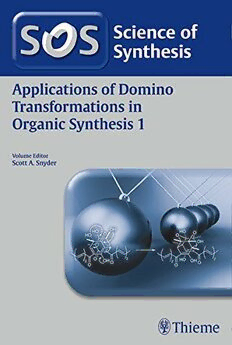
Applications of Domino Transformations in Organic Synthesis, Volume 1 PDF
Preview Applications of Domino Transformations in Organic Synthesis, Volume 1
escriptionofthefullclassificationprinciplescanbefoundinthenthesisGuidebook. METHOD 9.1.1.1VARIATION 9.1.1.2Selected9.1.1.1.1Products…etc.and9.1.1.1.2Reactions …etc. Foreachproductclassorsubclass,anumberofmethodsaredescribedforsynthesizingthegeneralproducttype.Oftentherearevariationsonamethodgiven.Bothmethodsandvariationscontainexperimentalprocedureswithrelevantbackgroundinformationandliteraturereferences.Selectedproductsandreactionsdisplaythescopeandlimitationsofthemethods. dy *AcompleteScienceofS VOLUME PRODUCTVol.9CLASS PRODUCTVol.109.1SUBCLASS …etc. 9.29.1.1 …etc.9.1.2 …etc. Eachcategoryissubdividedintovolumes(seeopposingpage),eachofwhichisdevotedtodiscretegroupingsofcompoundscalled(e.g.,“Thiophenes”isProductClass10ofproductclassesVolume9).Productclassesmaybefurthersubdividedinto,(e.g.,“Thiophene1,1-Dioxides”isProductproductsubclassesSubclass3ofProductClass10ofVolume9).Consequently,therelationshipbetweenheadingnameandheadingnumbervariesbelowproductclasslevelwithinindividualvolumes. * OrganizationalStructureofScienceofSynthesis CATEGORY Organometallics1(Vols1–8) Hetarenes2(Vols9–17) (cid:2)4/3CXbonds318–24(Vols)ProductsofOrganicSynthesis(cid:2)2CXbonds4(Vols)25–33 (cid:2)1CXbond5(Vols)34–42 AllCbonds64(Vols43–8) basedontheproductClassificationis,withallproductsbelongingtooneofsixbroad-rangingcategories.AllproductsoccupyastricthierarchicalpositioninScienceofSynthesis,definedaccordingtotheclassificationprinci-ples*.ProductsinCategories3–6areorganizedaccordingtooxidationstate,withproductscontainingthegreatest(cid:2)(cid:2)(cid:3)numberofcarbon–heteroatom(CX)orCC-bondstoasinglecarbonoccupyingthehighestpositions(e.g.,carboxylates,enolates,andalcoholatesarecoveredinCategories3,4,and5,respectively). ,n o hi s e a c organicchemistryinamodular f, (),()ns5Structuresand6articularcurrentinterestwithwledge Updatesand theReferen Advances Structures Science of Synthesis Reference Library TheScience of Synthesis Reference Librarycomprisesvolumescoveringspecialtopicsof: (), (), (), ()withsixmainclassifications1Classical2Advances3Transformations4Applicatio.TechniquesVolumesintheScience of Synthesis Reference Libraryfocusonsubjectsofp.contentthatisevaluatedbyexpertsin theirfieldScience of Synthesis, including theKno.Library, is thecompleteinformationsourceforthemodernsynthetic chemist Classical Transformations OrganicSynthesis Applications Techniques Science ofSynthesis ScienceofSynthesisistheauthoritativeand comprehensivereferenceworkfortheentire fieldoforganicandorganometallicsynthesis. ScienceofSynthesispresentstheimportant syntheticmethodsforallclassesofcompounds andincludes: – Methodscriticallyevaluated byleadingscientists – Backgroundinformationanddetailed experimentalprocedures – Schemesandtableswhichillustrate thereactionscope Science of Synthesis EditorialBoard E.M.Carreira E.Schaumann C.P.Decicco M.Shibasaki A.Fuerstner E.J.Thomas G.Koch B.M.Trost G.A.Molander ManagingEditor M.F.ShorttdeHernandez Senior K.M.Muirhead-Hofmann ScientificEditors T.B.Reeve A.G.Russell ScientificEditors E.L.Hughes M.J.White J.S.O(cid:2)Donnell F.Wuggenig E.Smeaton b GeorgThiemeVerlagKG Stuttgart·NewYork Science of Synthesis ApplicationsofDominoTransformationsin OrganicSynthesis1 VolumeEditor S.A.Snyder ResponsibleMember E.Schaumann oftheEditorialBoard Authors D.Adu-Ampratwum E.H.Kelley L.Shi E.A.Anderson A.Kirschning S.Sittihan K.W.Armbrust D.Lee C.R.J.Stephenson J.J.Devery,III T.J.Maimone M.Tang J.J.Douglas E.Merino P.Truong M.P.Doyle C.Nevado Y.-Q.Tu K.M.Engle M.O(cid:2)Connor K.K.Wan C.J.Forsyth T.Ohshima S.-H.Wang F.Gille K.A.Parker M.Wolling T.Halkina H.Renata X.Xu X.Hu A.Salvador Z.Yang T.F.Jamison R.A.Shenvi b 2016 GeorgThiemeVerlagKG Stuttgart·NewYork IV (cid:3)2016GeorgThiemeVerlagKG Dateofpublication:May11,2016 R(cid:4)digerstrasse14 D-70469Stuttgart Copyright and all related rights reserved, especially therightofcopyinganddistribution,multiplication PrintedinGermany andreproduction,aswellasoftranslation.Nopartof Typesetting:Ziegler+M(cid:4)ller,Kirchentellinsfurt this publication may be reproduced by any process, PrintingandBinding:AZDruckundDatentechnik whetherbyphotostatormicrofilmoranyotherproce- GmbH,Kempten dure, without previous written consent by the pub- lisher.Thisalsoincludestheuseofelectronicmedia ofdataprocessingorreproductionofanykind. BibliographicInformationpublishedby Thisreferenceworkmentionsnumerouscommercial DieDeutscheBibliothek and proprietary trade names, registered trademarks andthelike(notnecessarilymarkedassuch),patents, DieDeutscheBibliothekliststhispublicationinthe productionandmanufacturingprocedures,registered DeutscheNationalbibliografie;detailedbibliographic designs,anddesignations.Theeditorsandpublishers dataisavailableontheinternetat<http://dnb.ddb.de> wishtopointoutveryclearlythatthepresentlegalsit- uation in respect of these names or designations or trademarksmustbecarefullyexaminedbeforemak- LibraryofCongressCardNo.:appliedfor inganycommercialuseofthesame.Industriallypro- ducedapparatusandequipmentareincludedtoanec- essarily restricted extent only and any exclusion of BritishLibraryCataloguinginPublicationData productsnotmentionedinthisreferenceworkdoes Acataloguerecordforthisbookisavailablefromthe not imply that any such selection of exclusion has BritishLibrary been based on quality criteria or quality considera- tions. Warning! Read carefully the following: Although thisreferenceworkhasbeenwrittenbyexperts,the usermustbeadvisedthatthehandlingofchemicals, microorganisms, and chemical apparatus carries po- tentially life-threatening risks. For example, serious dangers could occur through quantities being incor- rectly given. The authors took the utmost care that the quantities and experimental details described hereinreflectedthecurrentstateoftheartofscience whentheworkwaspublished.However,theauthors, editors,andpublisherstakenoresponsibilityastothe correctnessofthecontent.Further,scientificknowl- edgeisconstantlychanging.Asnewinformationbe- comes available, the user must consult it. Although theauthors,publishers,andeditorstookgreatcarein publishingthiswork,itispossiblethattypographical errors exist, including errors in the formulas given herein.Therefore,itisimperativethatandthere- sponsibility of every user to carefully check whetherquantities,experimentaldetails,oroth- erinformationgivenhereinarecorrectbasedon theuser(cid:2)sownunderstandingasascientist.Scale- upofexperimentalprocedurespublishedinScience ofSynthesiscarriesadditionalrisks.Incasesofdoubt, theuserisstronglyadvisedtoseektheopinionofan expertinthefield,thepublishers,theeditors,orthe authors.Whenusingtheinformationdescribedhere- in, the user is ultimately responsible for his or her own actions, as well as the actions of subordinates and assistants, and the consequences arising there- ISBN978-3-13-173141-8 from. eISBN 978-3-13-202851-7 V Preface Asthepaceandbreadthofresearchintensifies,organicsynthesisisplayinganincreasing- lycentralroleinthediscoveryprocesswithinallimaginableareasofscience:fromphar- maceuticals, agrochemicals, and materials science to areas of biology and physics, the most impactful investigations are becoming more and more molecular. As an enabling science,syntheticorganicchemistryisuniquelypoisedtoprovideaccesstocompounds withexcitingandvaluablenewproperties.Organicmoleculesofextremecomplexitycan, given expert knowledge,be prepared withexquisite efficiency and selectivity, allowing virtuallyanyphenomenontobeprobedatlevelsneverbeforeimagined.Withreadyac- cesstomaterialsofremarkablestructuraldiversity,criticalstudiescanbeconductedthat revealtheintimateworkingsofchemical,biological,orphysicalprocesseswithstunning detail. Thesheervarietyofchemicalstructuralspacerequiredfortheseinvestigationsand thedesignelementsnecessarytoassemblemoleculartargetsofincreasingintricacyplace extraordinary demands ontheindividual synthetic methodsused. They mustbe robust andprovidereliablyhighyieldsonbothsmallandlargescales,havebroadapplicability, and exhibit high selectivity. Increasingly, synthetic approaches to organic molecules musttakeintoaccountenvironmentalsustainability.Thus,atomeconomyandtheover- allenvironmentalimpactofthetransformationsaretakingonincreasedimportance. The need to provide a dependable source of information on evaluated synthetic methods in organic chemistry embracing these characteristics was first acknowledged over100yearsago,whenthehighlyregardedreferencesourceHouben–WeylMethoden der Organischen Chemie was first introduced. Recognizing the necessity to provide a modernized, comprehensive, and critical assessment of synthetic organic chemistry, in 2000 Thieme launched Science of Synthesis, Houben–Weyl Methods of Molecular Transformations. This effort, assembled by almost 1000 leading experts from both in- dustry and academia, provides a balanced and critical analysis of the entire literature fromtheearly1800suntiltheyearofpublication.Theaccompanying onlineversionof ScienceofSynthesisprovidestext,structure,substructure,andreactionsearchingcapa- bilitiesbyapowerful,yeteasy-to-use,intuitiveinterface. From2010onward,ScienceofSynthesisisbeingupdatedquarterlywithhigh-qual- ity content via Science of Synthesis Knowledge Updates. The goal of the Science of SynthesisKnowledgeUpdatesistoprovideacontinuousreviewofthefieldofsynthetic organicchemistry,withaneyetowardevaluatingandanalyzingsignificantnewdevelop- ments in synthetic methods. A list of stringent criteria for inclusion of each synthetic transformationensuresthatonlythebestandmostreliablesyntheticmethodsareincor- porated.TheseeffortsguaranteethatScienceofSynthesiswillcontinuetobethemost up-to-date electronic database available for the documentation of validated synthetic methods. Alsofrom2010,ScienceofSynthesisincludestheScienceofSynthesisReference Library,comprisingvolumescoveringspecialtopicsoforganicchemistryinamodular fashion,withsixmainclassifications:(1)Classical,(2)Advances,(3)Transformations,(4) Applications,(5)Structures,and(6)Techniques.TitleswillincludeStereoselectiveSynthesis, Water in Organic Synthesis, and Asymmetric Organocatalysis, among others. With expert- evaluatedcontentfocusingonsubjectsofparticularcurrentinterest,theScienceofSyn- thesisReferenceLibrarycomplementstheScienceofSynthesisKnowledgeUpdates, tomakeScienceofSynthesisthecompleteinformationsourceforthemodernsynthetic chemist. VI Preface TheoverarchinggoaloftheScienceofSynthesisEditorialBoardistomakethesuite ofScienceofSynthesisresourcesthefirstandforemostfocalpointforcriticallyevaluat- edinformationonchemicaltransformationsforthoseindividualsinvolvedinthedesign andconstructionoforganicmolecules. Throughout the years, the chemical community has benefited tremendously from the outstanding contribution of hundreds of highly dedicated expert authors who have devotedtheirenergiesandintellectualcapitaltotheseprojects.Wethankallofthesein- dividualsfortheheroiceffortstheyhavemadethroughouttheentirepublicationprocess tomakeScienceofSynthesisareferenceworkofthehighestintegrityandquality. TheEditorialBoard July2010 E.M.Carreira(Zurich,Switzerland) E.Schaumann(Clausthal-Zellerfeld,Germany) C.P.Decicco(Princeton,USA) M.Shibasaki(Tokyo,Japan) A.Fuerstner(Muelheim,Germany) E.J.Thomas(Manchester,UK) G.A.Molander(Philadelphia,USA) B.M.Trost(Stanford,USA) P.J.Reider(Princeton,USA)
